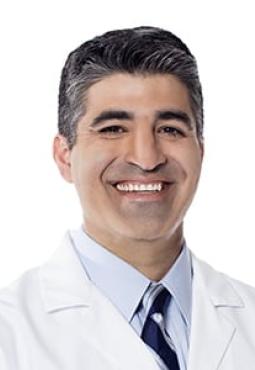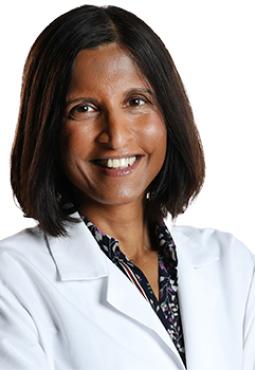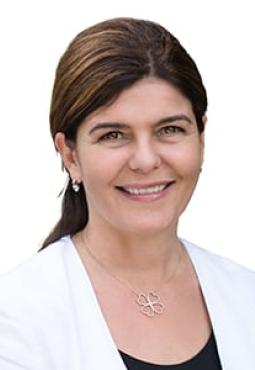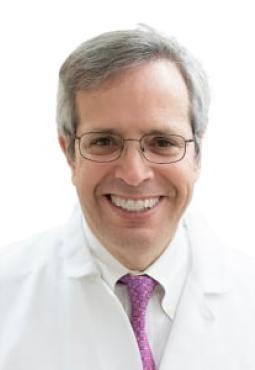Doctors and scientists from City of Hope presented data on potential new treatment options for hematological cancers and a way to predict disease outcomes in patients with diffuse large B-cell lymphoma, as well as novel therapies targeting complications like post-transplant infections, at this year’s American Society of Hematology (ASH) conference in New Orleans, held Dec. 10 to 13.
“The robust data being presented at the ASH conference this year demonstrates the innovative science and research happening across a broad range of blood cancers, and the tremendous promise and hope this can mean for patients now and in the future,” said Eileen Smith, M.D., City of Hope’s Francis & Kathleen McNamara Distinguished Chair in Hematology and Hematopoietic Cell Transplantation. “From promising investigational immunotherapies and stem cell transplantation to potentially practice-changing prognostic tests, City of Hope, along with our colleagues at Cancer Treatment Centers of America and Translational Genomics Research Institute, continue to accelerate the development and delivery of transformative treatments with the ultimate goal of improving outcomes for people with blood cancers.”
Highlights of City of Hope research presented at the ASH conference include:
Preventing Post-Stem Cell Transplant Viral Infections
For people receiving infusions of stem cells from a donor — known as an allogeneic hematopoietic cell transplantation (allo-HCT) — to help treat blood cancers, viral infections are a constant threat due to limited immune function. Keeping viruses like Epstein-Barr, cytomegalovirus, human herpes virus 6, adenovirus and polyoma viruses at bay is a challenge.

New data in a study led by Sanjeet Dadwal, M.D., City of Hope professor and chief of the Division of Infectious Diseases in the Department of Medicine, who specializes in treating infections in cancer patients, shows promising results for posoleucel, off-the-shelf multivirus-specific T cells, in preventing clinically significant viral infections after high risk allo-HCT.
Twenty-six participants received infusions of posoleucel after high risk allo-HCT. Results showed a low incidence of clinically significant viral infections with six targeted viruses: adenovirus, BK virus, cytomegalovirus, Epstein-Barr virus, human herpesvirus 6 and JC virus.
According to Dadwal, the therapy was well tolerated, even after multiple infusions. And benefits from posoleucel persisted even in the face of expected low-level viral reactivations throughout the study.
Pending results from an ongoing placebo-controlled Phase 3 study of posoleucel, the therapy could be approved in future for clinical use in preventing significant infections from these six DNA viruses among allo-HCT recipients.
“Based on our findings, in addition to preventing infections, other potential applications could include treatment of active viral infections using off-the-shelf, virus-specific T cells in patients who are unable to mount an adequate immune response, particularly allo-HCT patients,” Dadwal said.
New Way to Profile Risk for B-cell Lymphoma Patients
For people with diffuse large B-cell lymphoma (DLBCL), induction chemotherapy — a short and intense course of drugs to try to clear the blood of cancer cells — is the first line of defense against the disease. Now, results from a clinical trial suggest that testing levels of circulating tumor DNA (ctDNA) in previously untreated DLBCL patients after one to two cycles of induction therapy could help predict disease outcomes.

Alex Herrera, M.D., associate professor in City of Hope’s Department of Hematology & Hematopoietic Cell Transplantation, reported on an analysis of data from the POLARIX study, a Phase 3 clinical trial in patients with DLBCL comparing two lines of chemotherapy: polatuzumab vedotin with rituximab-cyclophosphamide, doxorubicin and prednisone (Pola-R-CHP) versus rituximab-cyclophosphamide, doxorubicin, vincristine and prednisone (R-CHOP). Herrera and a team of researchers investigated ctDNA levels at baseline and on day one of participants’ second cycle of chemotherapy.
“What we saw in this study is that patients who had lower levels of circulating tumor DNA in their blood after one treatment cycle had better rates of progression-free survival and longer overall survival than patients who did not see a notable reduction of circulating tumor DNA after one cycle of chemotherapy,” Herrera said.
Furthermore, the researchers saw that ctDNA clearance was predictive of better outcomes independent of other key baseline risk factors.
“Our findings show that early changes in circulating tumor DNA levels may be a helpful tool to design clinical trials that improve on our standard treatment by adapting therapy based on ctDNA results,” Herrera said. “We could imagine developing a study where we add a novel therapy in patients with an insufficient ctDNA response, or we de-escalate therapy in patients with an excellent early ctDNA response.”
Reducing GVHD in Transplant Recipients Using New Cell Therapy
Allogeneic hematopoietic cell transplantation (allo-HCT) can be curative for many blood disorders, including cancer, but the process works best when the patient and donor have the same human leukocyte antigen (HLA) type. While progress has been made in making half-matched, or haploidentical, transplants more successful using post-transplant cyclophosphamide, a potent chemotherapy drug, high rates of relapse and chronic graft versus host disease (GVHD) following myeloablative conditioning, which destroys a patient’s bone marrow cells before they are replaced, pose significant risks for recipients.
Amandeep Salhotra, M.D., associate professor in the Department of Hematology and Hematopoietic Cell Transplantation, reported on a potential new alternative to cyclophosphamide called Orca-Q, which is an investigational precision-engineered cell therapy.
Orca-Q is made up of enriched stem cells combined with specific T cell subsets to help build up the blood and immune systems.
In a Phase 1 study of 21 patients with haploidentical donors who were eligible for myeloablative regimens, a research team led by Salhotra found Orca-Q to be beneficial. It resulted in low toxicity and superior control of acute and chronic GVHD and, therefore, better long-term survival.
“This type of graft is better tolerated by patients as it avoids the use of high-dose chemotherapy after the infusion of cells, which is currently the only way to do haploidentical transplants,” Salhotra said. “As such, older patients and those with co-morbid conditions will likely be able to benefit from myeloablative conditioning using Orca-Q graft therapy.”
This Phase 1 study is ongoing, and Salhotra hopes to be able to extend the benefits of Orca-Q to patients undergoing reduced-intensity conditioning regimens.
Novel Salvage Therapy Successful in Relapsed Lymphoma Patients
For high-risk people with classic Hodgkin lymphoma whose disease has relapsed or is resistant to treatment, a new line of therapy has demonstrated promising results in clinical trials.
Matthew Mei, M.D., City of Hope associate professor in the Department of Hematology & Hematopoietic Cell Transplantation, presented findings from a study that investigated the anti-tumor effects of nivolumab, an anti-PD1 monoclonal antibody, in combination with ifosfamide, carboplatin, and etoposide (ICE) chemotherapy in 32 high-risk patients with relapsed/refractory Hodgkin lymphoma.
Mei and his team found the combination is well-tolerated and a highly effective second-line treatment, which facilitated subsequent autologous stem cell transplant. All patients had a response to the treatment, and 88% achieved complete remission, with toxicity comparable to that of chemotherapy alone.
“The combination of checkpoint inhibition with cytotoxic chemotherapy has now been validated in multiple studies, with much higher complete remission rates than historical controls,” Mei said. “The next step will be to compare this approach to chemotherapy salvage alone, and a large cooperative group study is planned to address this question.”
Trial Testing New Drug Combo for Multiple Myeloma
Multiple myeloma remains incurable for most patients, but the development of new treatment regimens is helping to improve outcomes.
Amrita Krishnan, M.D., director of the Judy and Bernard Briskin Center for Multiple Myeloma Research at City of Hope, discussed a new clinical trial that will open at City of Hope early next year. The goal is to further test combination frontline therapies for multiple myeloma that do not include autologous stem cell transplants.

“The trial uses the newest Food and Drug Administration-approved drug for multiple myeloma, called teclistamab, which is currently approved for patients with relapsed disease,” Krishnan said. “We are trying to find out if using it earlier in the course of multiple myeloma will lead to deeper and longer remissions than the current approaches.”
Called MajesTEC-7, the trial is a Phase 3, randomized study comparing the efficacy of teclistamab plus daratumumab plus lenalidomide (Tec-DR) versus daratumumab plus lenalidomide and dexamethasone (DRd) in newly diagnosed multiple myeloma patients who cannot receive or do not wish to undergo an autologous stem cell transplant as an initial treatment.
Krishnan and her team hope to enroll 1,000 participants with newly diagnosed and measurable disease, ages 18 or above, who will be randomized to receive either Tec-DR or DRd.
Targeting Energy Supplies in Acute Myeloid Leukemia
Because acute myeloid leukemia (AML) is a blood cancer that progresses rapidly, it is currently associated with poor outcomes, particularly in adults. But City of Hope researchers believe they may have found a new way to stop AML in its tracks.

Flavia Pichiorri, Ph.D., a professor in the Department of Hematologic Malignancies Translational Science and the Judy and Bernard Briskin Center for Multiple Myeloma Research, presented novel findings associated with a molecule called CD84 that her team found expressed at high levels on the surface of AML cells.
This study was led by Yinghui Zhu, Ph.D., a former postdoctoral researcher in Pichorri’s laboratory and currently an assistant professor at Tongji University in Shanghai.
To test whether this increased expression promotes AML growth, the researchers ran experiments to disrupt CD84. They found that these disruptions inhibited AML cell growth and deregulated mitochondria — which play a large role in metabolism — in these cancer cells.
“These findings open the door for potential novel treatments for AML that target CD84, including the development of immune engagers or directing potent toxins to selectively kill AML cells,” said Pichiorri, the study’s senior investigator.
Based on their discoveries, Pichiorri and her team, in collaboration with the laboratory of John Williams, Ph.D., a City of Hope professor in the Department of Cancer Biology and Molecular Medicine, tested antibodies that target CD84 and showed that their administration prevents AML progression and increases survival in preclinical mouse models.
“We will now work on translating these laboratory experiments into CD84-targeting agents with the intention of bringing therapies to patients in short order,” Pichiorri said.
Mentor Is Honored

Michael Caligiuri, M.D., president of City of Hope National Medical Center and Deana and Steve Campbell Physician-in-Chief Distinguished Chair, received an ASH Mentor Award, which recognizes outstanding mentors in the hematology community. Caligiuri has dedicated much of his career to mentoring the next generation of physicians, scientists and physician-scientists. Over the last three decades, he has mentored more than 100 individuals and has had a profound impact on their careers.
